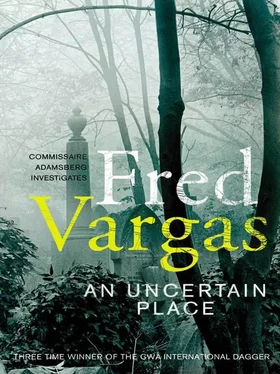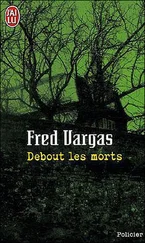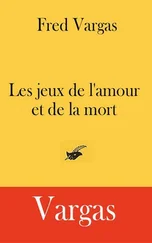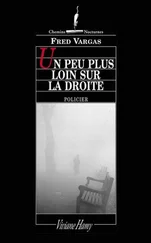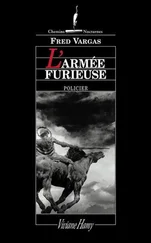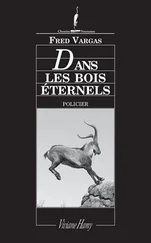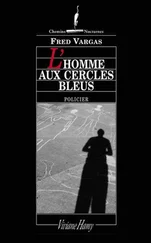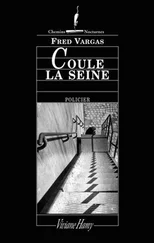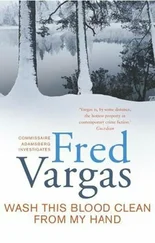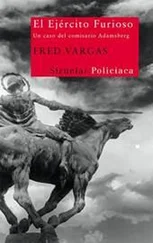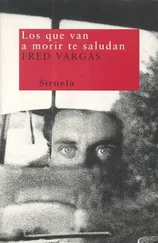Adamsberg slipped outside. With a bit of luck, on his return, he would find Vladislav floating on waves of cannabis, and unable to speak. He took his pink and green files and walked up and down until the lights went out a couple of hours later. Vladislav was fast asleep with a smile on his face, shirtless, his torso covered with dark hair like a cat of the night.
Adamsberg felt as if he had dropped off to sleep quickly but superficially, his hand on his stomach, the fish perhaps being hard to digest. Or else the prospect of the next five or six days. He would go off to sleep for a few minutes, then wake up again with scraps of dreams about Plogoff oysters which seemed to be going round and round in his head. Frau Abster’s description superimposed itself on the menu, getting mixed up with the solette, written with the same typeface, Frau Abster born in Plogoff to Franz Abster and Erika Plogerstein . The words were stupidly entwined and Adamsberg turned on his side trying to shake himself free of them. Or maybe they weren’t so stupid. He opened his eyes, alert to the familiar alarm signal that he sometimes felt before he realised what it was telling him.
It was the name: Frau Abster, born to Franz Abster and Erika Plogerstein , he thought, switching on his bedside lamp. There was something about her mother’s maiden name, Plogerstein, which must have got confused with the solettes à la Plogoff. But why was that significant? Sitting up, he felt in his rucksack for his files, and the name of the Austrian victim suddenly emerged to join the Plogerstein/Plogoff mixture. Conrad Plögener. Adamsberg pulled out the description of the man who had been killed in Pressbaum, and held it under the lamp. Yes, Conrad Plögener, domiciled at Pressbaum, born 9 March 1961 to Mark Plögener and Marika Schüssler .
Plogerstein and Plögener. Adamsberg put the pink file on the bed and pulled out the white file, the French one. Pierre Vaudel, born to Jules Vaudel and Marguerite Nemesson .
No, nothing there. Adamsberg shook the shoulder of the long-haired cat lying on the other bunk in an elegant pose suitable for a luxury compartment.
‘Vlad, tell me something!’
The young man opened his eyes, surprised. He had undone his ponytail and his straight hair was loose over his shoulders.
‘Where am I?’ he asked, like a child waking in a strange bedroom.
‘You’re in the Venice-Belgrade train. You’re with a French cop and we’re on our way to Kisilova, your grandfather’s village, Dedo’s village.’
‘Yes,’ said Vladislav firmly, finding the connections again.
‘I’m waking you up, because I need some information.’
‘Yes,’ repeated Vladislav, and Adamsberg wondered if he was still high.
‘Your dedo, who were his parents? Did their names start with “Plog”?’
Vladislav burst out laughing in the dark, and rubbed his eyes. ‘Plog,’ he said, sitting up. ‘No Plogs, no.’
‘What was your dedo’s father called? Your great-grandfather. What was his name?’
‘Milorad Moldovan.’
‘And his mother? Your great-deda.’
‘Not deda, Adamsberg. Baba.’
Vladislav laughed again briefly.
‘Baba was called Natalja Arsinijević.’
‘And anyone else he knew, his friends, his cousins? No Plogs anywhere?’
‘ Zasmejavaš me , you make me laugh, commissaire , I really like you.’
And Vladislav lay down again, turning his back, continuing to chuckle into his hair.
‘No, wait!’ he said suddenly, sitting bolt upright. ‘There was a Plog. His old history teacher – he used to talk about him all the time. Mihail Plogodrescu. Actually he was a cousin, born in Romania, who came to teach in Belgrade, then he went to live in Novi Sad, but he retired to Kiseljevo. The two of them were inseparable, like brothers with an age difference of fifteen years. The weird thing was that they died just one day apart.’
‘Thanks, Vlad, go back to sleep.’
Adamsberg slipped out into the corridor in his bare feet walking on the dark blue carpet and looked at his notebook. Plogerstein, Plögener, Plogoff, Plogodrescu. A great catch, from which the solettes must of course be eliminated, because they had nothing to do with anything. A pity though, thought Adamsberg, crossing out the Breton name regretfully, because he wouldn’t have got as far as this without them. His two watches were showing 2.25 and 3.45 a.m. He woke up Danglard, who was apt to be tetchy at night.
‘What is it now?’ muttered the commandant grumpily.
‘Danglard, forgive me. Your nephew keeps laughing and I can’t sleep on this train.’
‘He was like that as a kid. He has a sunny disposition.’
‘Yes, you told me. Listen, Danglard, can you find something for me urgently? The names of the grandparents of Pierre Vaudel senior. Both sides and if necessary go back further, as far as you have to, until you find a Plog.’
‘What do you mean, a Plog?’
‘A surname starting with Plog. Like Plogerstein, Plögener, Plogoff, Plogodrescu. Frau Abster’s mother’s maiden name was Plogerstein, the man killed in Pressbaum was called Plögener and your uncle Slavko had a Romanian cousin called Plogodrescu. It must be his feet that are in Highgate, not your uncle’s. If that’s any consolation.’
‘And Plogoff?’
‘Just the sole we ate tonight, Vlad and me.’
‘OK,’ said Danglard. ‘I presume this is urgent. What’s behind it?’
‘I think they’re all the same family. Remember – the vendetta that Vaudel was afraid of?’
‘A vendetta against the Plog family? But why don’t they all have the same name?’
‘Diaspora, dissimulation, hiding their surname for some good reason.’
With a weight off his mind, Adamsberg managed to sleep for two hours before Danglard called him back.
‘Got your Plog,’ he said. ‘The paternal grandfather, who came from Hungary. He must have changed it to Vaudel.’
‘What was his name, Danglard?’
‘I just told you – Plog, Andras Plog.’
VLADISLAV PRESSED HIS NOSE TO THE WINDOW, GIVING A running commentary as the train pulled into Belgrade, as if it were a real adventure, now and again saying ‘Plog’ and laughing to himself. The translator’s good humour gave the expedition the feeling of a merry escapade, whereas in Adamsberg’s mind it was taking on a darker complexion the nearer they came to the hermetic village of Kisilova.
‘Belgrade means “white city”,’ Vladislav announced as the train pulled to a halt. ‘It’s very fine but we don’t have time to look around because the bus goes in half an hour. Do you often wake people up in the middle of the night to ask if there are any Plogs in their family?’
‘The police spend their lives waking other people up in the middle of the night. And being woken up themselves. It was worth it, because there was a Plog.’
‘Plog,’ said Vladislav, trying it out again as if blowing a bubble. ‘Plog. And why did you want to know?’
‘Plogerstein, Plögener, Plogoff, Plogodrescu and Plog,’ Adamsberg recited. ‘If we rule out Plogoff, the other four family names are all linked to the murder at Garches. Two of them are victims, and a third, the woman in Germany, is a friend of a victim.’
‘What’s this got to do with my dedo? Was his cousin Plogodrescu a victim?’
‘Yes, in a way. Take a peep into the corridor. The woman, wearing a beige suit, between forty and fifty, wart on her cheek, trying to look nonchalant. She was in the next compartment. Have a good look at her when we get out.’
Vladislav was the first to step down on to the platform and held out his furry arm to the woman in the suit, to help her with her suitcase. She thanked him without warmth and walked away.
Читать дальше
